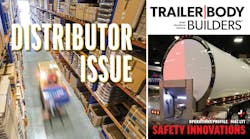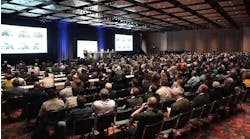INDIANAPOLIS—While clean energy is the future, diesel will primarily power trucking’s near future. But as more U.S. fleets face a patchwork of regulations nationwide, planning will be imperative.
“The regulations landscape is very challenging,” Mary Aufdemberg, GM of product strategy and market development for Daimler Truck North America, said after her keynote address to open up the Green Truck Summit during Work Truck Week here.
She said that the OEM—which made nearly 40% of all U.S. Class 8 truck sales last year—and its dealers are ready for California Air Resource Board’s Advanced Clean Truck regulations and upcoming federal greenhouse regulations aimed at trucking fleets.
“Diesel is still very critical to our industry and will be in the majority of trucks, I believe, through most of this decade,” Aufdemberg said. “The first thing is we have to make sure that we’re ready to meet the NOx rules, the CO2 rules, from a diesel engine perspective. So, of all the investments that I shared with everyone today, one of the biggest investments we’re making is still on our engine platform.”
One of the investments DTNA is making is in its dealer network. On Tuesday, the OEM unveiled its Battery-Electric Vehicle Dealer Certification Program. It builds on the company’s Elite Support Program, which certifies dealers committed to delivering superior customer service.
DTNA’s two commercial EVs—the Class 8 Freightliner eCascadia and medium-duty Freightliner eM2—have been delivered to more than 50 U.S. fleets and logged more than 4 million miles, according to the OEM.
Diesel not done (yet)
The Diesel Era is nearing its end, according to the fourth State of Sustainable Fleets Market Brief published last year. The report outlines a future where new diesel engine development slows as zero-emission vehicles become the centerpiece of regulations in states representing about half of the U.S. economy.
"We believe that 2027 could very well be the last of the major diesel engine development programs that we see out there in the world—which is pretty amazing," Erik Neandross, chief executive of Gladsetein, Neandross & Associates, which produced the annual study, said during last year’s Advanced Clean Transportation Expo.
Much more public attention is on transportation efficiency this decade, but the industry has been squeezing more and more out of every gallon of diesel for years. A heavy-duty truck built 30 years ago produced more emissions than 60 new diesel trucks built today, Aufdemberg noted during her keynote address.
“We have not stopped making this a cleaner world,” she said. "In the past 15 years, the emissions from semi trucks have been reduced by more than 20%, but we want to do more.”
The global truckmaker is also developing alternative powertrains based on battery-electric and hydrogen. “If I look back in the last two to five years, we’ve seen tremendous innovation and amazing action,” Aufdemberg said. “We know that clean diesel will be an important part of this equation this decade as well as the next.”
Daimler Truck wants all its new trucks to be carbon-neutral by 2039 in the U.S., Europe, and Japan, and globally by 2050. “But we also know we can’t do it alone,” she added.
DTNA, the parent company of Freightliner and Western Star trucks, partnered with Cummins to help it meet medium-duty truck regulations, Aufdemberg noted. Freightliner medium-duty sales made up 21% of the market in 2023, according to the American Truck Dealers trade group.
Daimler, Cummins, and Paccar are investing up to $3 billion in a commercial vehicle battery plant in Mississippi, which is expected to begin production in 2027. DTNA also partnered with Volvo Group North America and Navistar to form Powering America’s Commercial Transportation coalition to create a shared voice to promote and educate policymakers on nationwide ZE infrastructure. In Europe, Volvo Group and Daimler are partnering on a hydrogen fuel cell electric heavy-duty powertrain called Cellcentric.
“It’s super important now to get people around the table that don’t normally speak to each other in order to drive speed to market and get this done,” Peter Voorhoeve, VTNA president, said last month during an event announcing the PACT coalition.
Greener regulations
Like its rival OEMs, DTNA is developing multiple clean-transportation paths while still focusing on what powers over-the-road trucking: diesel fuel and internal combustion engines.
“And getting ready for ‘27, we also have a big platform investment,” she added. “Please know that diesel is still a massive commitment for us. And we’re still a part of making that diesel engine cleaner and more efficient for our customers and to meet regulations, but it’s definitely getting tougher.”
The OEM is prepared if fleets want to buy equipment ahead of 2027 CARB and U.S. Environmental Protection Agency regulations aimed to reduce nitrogen-oxide emissions from large trucks and push fleets toward zero-emission vehicles, something Daimler Truck CEO Martin Daum told analysts and investors last week.
Aufdemberg noted that the EPA’s proposed third phase of its Greenhouse Gas Emissions Standards for Heavy Duty Vehicles, known as GHG3, would require manufacturers to sell increasing percentages of ZEVs to be able to sell diesel trucks also. And some states are following California’s lead to regulate new diesel truck registrations.
“So even with all the diesel regulations happening, we're finding the zero-emission vehicle penetration requirements will become the limiting factor for our customers to register units in each of those states,” she explained. “So we’re working through that in California right now.”
Aufdemberg said the OEM has growing offerings to meet California’s stringent fleet regulations this decade. But she suggested that fleets and suppliers also focus on CARB-level “opt-in states” such as Massachusetts, New Jersey, New York, and Oregon. “They’ll need to have units registered in their state under zero emissions before they can also register diesel trucks in the years to come. That’s a challenge that’s really facing us as an industry in the near term.”
DTNA is working with its dealers so they can be ready to serve local customers. “Similar to a customer journey, the journey to zero-emission readiness from a dealer perspective will also evolve based on what’s happening in your region and the customers that are taken care of,” she explained. “One size doesn’t necessarily fit all. The activities that we’re doing with some dealers today—California—maybe those activities will need to be repeated one or two years from now for another dealership. So we can’t lose that playbook. That’s really important to our planning journey.”
DTNA’s BEV dealer program
DTNA’s BEV Dealer Certification program covers how Freightliner dealers can help fleet customers begin zero-emission operations.
Starting with Detroit eConsulting, the program aids customers in understanding their infrastructure and vehicle optimization needs, from spec’ing and maintaining electric trucks. According to DTNA, the certification encompasses every aspect of electrification. Freightliner’s dealer network is investing to meet the program’s more than 75 specific criteria.
Those BEV certification criteria are divided into four areas:
Safety
-
Comprehensive safety policy and training, nominating a frontline contact person, and being fully equipped with high-voltage safety-specific equipment
Charging infrastructure
-
Commercial vehicle charging infrastructure, including stationary or mobile charging solutions
-
Baseline competency to enable infrastructure and vehicle deployment readiness activities backed by the expert-level support of the Detroit eConsulting team
Dealership infrastructure
-
Dedicated BEV service bays, battery storage space, and critical parts stocking, plus installation of safety signage
Training
-
BEV training and resources for the dealership personnel covering all aspects of the dealership business; sales, service, and parts
“Having our dealer network BEV certified benefits the market as a whole,” according to Drew Backeberg, SVP of aftermarket at DTNA. “For customers owning or purchasing an electric vehicle in the near term, it is likely their first experience with electrification in the heavy-duty truck space. We see it as our responsibility to support them on their journey. For wider market adoption, we need experts and safety leaders, and we want to ensure that our dealer network sets the standard high through our new BEV Dealer Certification Program.”
Eight dealerships have already completed the certification. DTNA expects that number to double in the coming weeks. The OEM expects to have 100 dealer locations certified by 2025.









